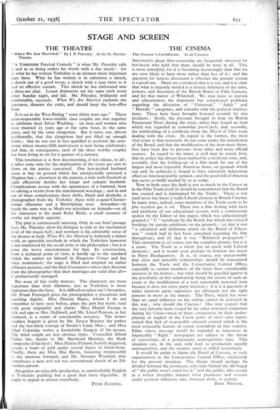The Censor's Certificate. At all Cinemas
THE CINEMA
ARGUMENTS about film-censorship, are frequently obscured by hot-heads who hold that there should be none at all. This is most unhelpful, for it is becoming increasingly clear that we are soon likely to have more rather than less of it ; and the question for serious discussion is whether the present system is a good one. Many are convinced that it is not, and it is clear that what is urgently needed is a stricter definition of the aims, powers, and discretion of the British Board of Film Censors, and for that matter of Whitehall. We may leave to purists and educationists the important but complicated, problems regarding the allocation of " Universal," " Adult " and " Horrific " categories, and consider only the political implica- tions. These have been brought forward recently by two incidents : firstly, the pressure brought to bear on British Paramount News during the crisis, when they issued an item which was regarded as somewhat pro-Czech, and, secondly, the withholding of a certificate from the March of Time issue dealing with the crisis. In regard to the former, the most vital point is that newsreels do not come under the jurisdiction of the Board, and that the modification of the item must there- fore have been due to pressure from other and more official sources. In regard to the latter, it well may be noted, first, that its policy has always been marked by a moderate tone, and, secondly, that the holding-up of a film made by one of the largest and most reputable American firms, on grounds which can only be political/ is bound to have extremely deleterious effect on American public opinion ; and the good will of America was never so badly needed by us as today.
Now in both cases the fault is not so much in the Censor as in the Film Trade itself (it should be remembered that the Board was created and is maintained by the Trade). There is not (and never has been) a really Liberal element in British Cinema. In many ways, indeed, some members of the Trade seem to be plus royaliste que le mi. There was a film dealing with facts and problems of our educational system, with a commentary spoken by the Editor of this paper, which was unhesitatingly granted a " U " certificate by the Board, but which was refused bookings by certain exhibitors on the grounds : (a) that it was " a calculated and deliberate attack on the Board of Educa- tion " (which had in fact been consulted regarding the film throughout), and (b) that it was " Bolshevik propaganda." This extremism is, of course, not the complete picture, but it is a straw. The Trade as a whole has no truck with Liberal elements ; - and it would seem perhaps to kowtow too much to Party Headquarters. It is, of course, not unreasonable that close and amicable relationships should be maintained between the Trade and the Conservative Central Office, especially as certain members of the latter have considerable interests in the former ; but what should be guarded against is the possibility of this relationship being the means of such an event as the modification of a very reasonable newsreel item because it does not serve party interests ; if it is a question of wider interests party organisers are obviously not the right persons to move in the matter. The Press, which has more than an equal influence on the nation, cannot be jockeyed in this way ; why should the Cinema ? One may suspect that the very fulsome items issued by the other newsreel companies during the Crisis—most of them conspicuous by their under- playing or neglect of the Czech point of view—also repre- sented that lack of responsible editorial control which is the most noticeable feature of screen journalism in this country. Films whose message would be regarded as innocuous in impeccably " Right " newspapers are subject to the threat of censorships of a perniciously unimaginative type. This situation can, in the end, only lead to production equally unimaginative, and the creative spirit is stifled accordingly.
It would be unfair to blame the Board of Censors, or such organisations as the Conservative Central Office, exclusively for the present situation. The blame should perhaps be divided betWeen the producers, who hide behind the old bogey of " the public won't stand for it," and the public, who accept in a rather sheeplike manner what producers and censors under partisan influence care, between them, to permit.
BASIL WRIGHT.















































 Previous page
Previous page